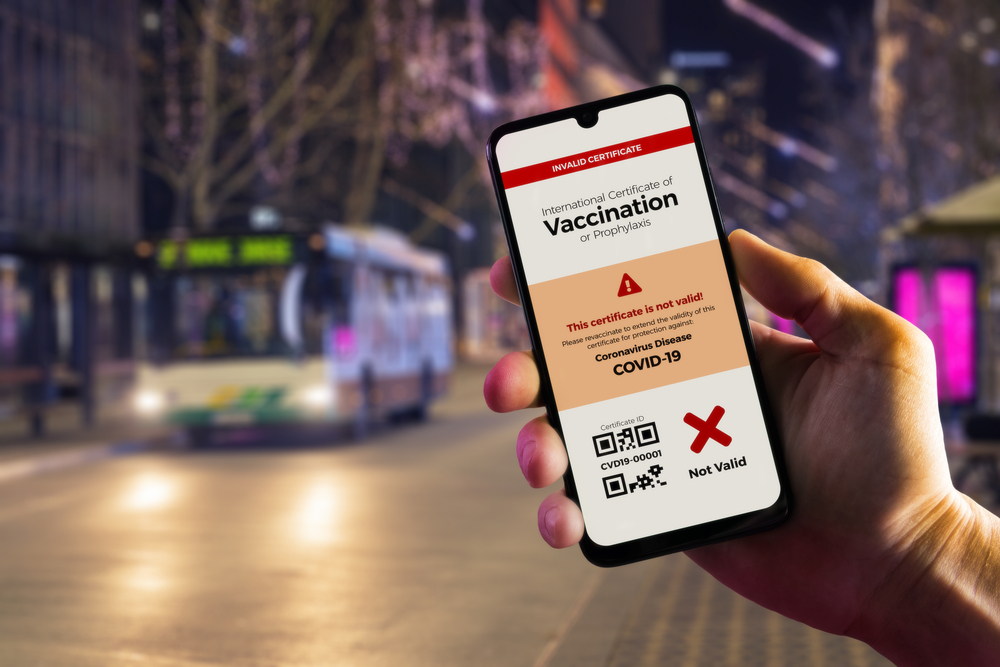UK-based Ada Lovelace Institute is gathering evidence on the legal, ethical, social, and health challenges of deploying digital health passports and COVID status apps ahead of an upcoming report aimed at guiding government rollouts.
On Tuesday, the British think tank on data, AI, and society put out an open call to “public health officials, civil society organizations, researchers and interested citizens from across the world” to present evidence on the potential risks and benefits that come with implementing vaccine passports and COVID status apps.
The @AdaLovelaceInst launches an evidence review and expert deliberation of vaccine passports and COVID status apps chaired by Professor Sir Jonathan Montgomery.https://t.co/ROeypvbRWN
— Ada Lovelace Institute (@AdaLovelaceInst) January 12, 2021
“The evidence review will begin work in January 2021 with a call for evidence and a series of public events focused on the history of vaccine certifications, the technical design for digital certification regimes, and the ethical, health and legal challenges they may pose.”
As part of the assessment, the Ada Lovelace Institute is looking to gather evidence on a series of topics as they relate to the rollouts of digital health passports and COVID status apps, including:
- Science – What is the current scientific understanding of how different vaccination regimes, in terms of type and dosage, affect individuals’ relative risk of disease and transmission? How does this risk change over time after doses have been administered?
- History – What is the history of vaccine certifications? How have they been used elsewhere? What’s different this time around?
- Uses – What are the possible public- and private-sector uses of vaccine passports and COVID-19 status apps today? Are there current uses or projects already underway?
- Design – What technical design decisions can and should be made, including on security, authentication, identity linkage, interoperability and data sharing?
- Law – How do existing laws and regulations apply to vaccine passports and COVID-19 status apps and their potential use cases?
- Ethics – What are the ethical trade-offs involved in discriminating on the basis of vaccination status to grant differential freedom from restrictions?
- Economics – What will be the economic impacts at a macro and micro level, and their distributional impacts across groups, such as frontline health and care staff, gig workers, freelancers, etc.?
- Social impact – What are the potential societal impacts, including stigmatization and discrimination; loneliness and community cohesion? Will these systems reinforce concentrations of power, within and between countries?
- Behavior – What will be the behavioral impacts on e.g. vaccine uptake? How should we communicate about vaccine passports and health status apps?
- International – What are international approaches to rolling out or regulating use? How will these systems interact with existing health practice and vaccination regimes across the world?
Source: Ada Lovelace Institute
Evidence will be reviewed by an “independent panel,” and the institute will be publishing a series of short reports from each of the public events.
“A report designed to provide guidance to the UK, and other national governments, on the potential roll-out of digital vaccine certification schemes and understand which red lines not to cross and where to focus regulatory attention” — Ada Lovelace Institute
Following the conclusion of the evidence review, a forthcoming report will be issued “to provide guidance to the UK, and other national governments, on the potential roll-out of digital vaccine certification schemes and understand which red lines not to cross and where to focus regulatory attention.”
In April, 2020, the British think tank gathered evidence for a similar report on contact tracing called “Exit through the App Store?” — in which they also explored the concept of digital immunity certification.
The report concluded that back in April, there was “no credible basis for establishing a comprehensive regime of immunity certification” due to an “insufficient understanding of immunity” and having “no robust scientific means of testing for immunity.”
This week, the Ada Lovelace Institute launched its latest open call for evidence on digital health passports and COVID status apps on the same day that British media reported that the government had begun trialing digital COVID-19 vaccine passports for those who had already been vaccinated in the UK.
The digital passport being trialed is an app developed by biometrics firm iProov and cybersecurity firm Mvine.
“Though the Department of Health said that there were ‘no plans’ to introduce vaccine passports, the Government’s own science and research funding agency Innovate UK has already pumped £75,000 into the project,” The Daily Mail reported.
With ethical governance, digital health passports, immunity passports, and COVID status apps have the potential to ease society towards safely opening up movement, travel, and other activities.
At the same time, the personal data collected faces the ever-present risk of being compromised by cyber criminals, abused by law enforcement and governments, or exploited by third-party vendors.
Correction: A previous version of this story stated, “Though the Department of Health denied that there were ‘no plans’ to introduce vaccine passports, the Government’s own science and research funding agency Innovate UK has already pumped £75,000 into the project.”
The quote has been corrected in story above.
COVID-19 data collection poses post 9/11 privacy abuse risks: CNAS, DataGovHub panel












